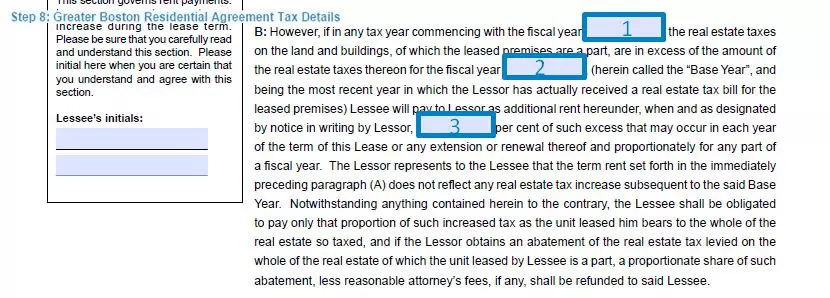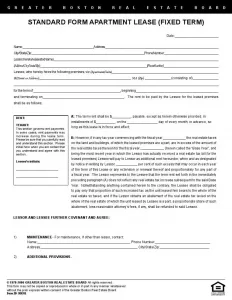Greater Boston Residential Agreement Form
Greater Boston has its own rules for individuals who wish to enter into a lease agreement. A Greater Boston residential agreement is a binding legal form used in Boston to outline the relationships between the lessor and the lessee regarding residential property.
The parties are called the “landlord” and the “tenant” in most documents. The laws regarding residential agreements in Boston are straightforward, but some requirements existing in this city do not exist in other regions of the country.
In Greater Boston, the security deposit rules are more extensive than in many states. The deposit can equal one month’s rent (either the first or the last) or the cost of new locks (together with installation). The landlord should keep it in a separate bank account with interest and provide the tenant with receipts. The landlord has 30 days from the start of the lease period to make a full list of damages already present. The tenant then has 15 days to argue in case they disagree.
Massachusetts rental lease agreement forms – access other rental lease agreement templates for Massachusetts with directions.
Build Your Document
Answer a few simple questions to make your document in minutes
Save and Print
Save progress and finish on any device, download and print anytime
Sign and Use
Your valid, lawyer-approved document is ready
The security deposit can apply to different issues, such as covering the outstanding rent at the end of the tenancy. It can also repair the damages caused to the property and items in it during the tenancy because of improper usage. The tenant can take the landlord to court if they do not return the deposit within 30 days from the end of the lease or if they disagree with the list of deductions.
The landlord in Greater Boston cannot ask the prospective tenants for the following fees:
- Fees to hold the property
- Application taxes
- Credit check charges
- Finder’s charges (unless they are a broker with a license)
Make sure that you read the residential agreement carefully before signing it and that you fully understand it and agree with the terms. You can have a tenancy-at-will agreement with the landlord, which operates on a month-to-month basis and can be either oral or written. However, a proper residential agreement gives you more security.
The landlord must ensure that the property complies with the Sanitary and Building Codes of the city and the state. The tenant can report any violations, and the Greater Boston Department of Neighborhood Development recommends they do it in writing. If nothing changes, the tenant can call the Inspectional Services.
Greater Boston Residential Agreement Form Details
| Document Name | Greater Boston Residential Agreement Form |
| Other Name | Greater Boston Real Estate Board lease |
| Relevant Laws | Massachusetts General Laws, Chapter 186 |
| Avg. Time to Fill Out | 10 minutes |
| # of Fillable Fields | 41 |
| Available Formats | Adobe PDF |
How to Fill Out a Greater Boston Residential Agreement
Generating a needed template may seem challenging, as there is a great amount of important data to count on. Thus, we recommend our latest software to build a corresponding pattern.
1. Date the Form
State the date when the agreement is created.

2. Provide the Full Name of the Lessor
The landlord should be easily identified.

3. Add the Full Address Details of the Lessor
The contact address should be valid so that the landlord can be reached in case of emergency or other property-related issues.

4. Provide the Contact Details of the Leaseholder
Include the phone number in the landlord’s contact details.

5. Identify the Property That is Being Rented
You should always include the full address of the property in a lease agreement.

6. Confirm the Period of the Lease
State the beginning and the end dates of the lease.

7. State the Rent Amount
Include both the full rent that will be paid by the tenant and the monthly amount.

8. State the Tax-Related Details of the Lease
You will need to identify the first fiscal year of the lease and other tax-related details. These include what the increase will be in percentages and how the tenant will cover it.

9. Introduce the Person Who Will Be Responsible for Repairs and General Maintenance
Include their names and contact details.

10. List Any Additional Details
The landlord and the tenant may agree on other details and include them in this section.

11. Sign the Form
Provide signatures of both parties.

12. Include the Signatures of Witnesses or the Notary Public if Applicable
This is not a requirement in Greater Boston, but it is usually highly recommended.



Try our document builder to customize any form available on FormsPal to your preferences. Here is a number of various other printable Massachusetts forms we offer.